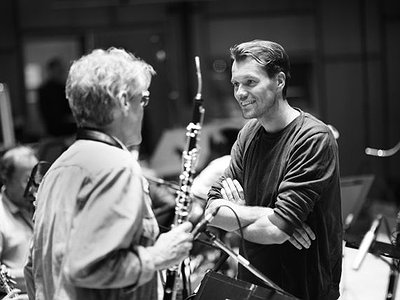Soundtrack composers typically need to adapt their ideas to the film, the director and the audience. How do you maintain a balance between, on the one hand, artistic integrity and sticking to your creative convictions and, on the other, being professional? How do you find a sense of freedom within these structures?
I have never felt that I have put my artistic integrity on the shelf while making film music. First and foremost I love to make music, and it is a privilege to be allowed to do it every day. I get excited by films that can have a larger-than-life musical approach, just as much as an intimate, character-driven and grounded style. The only thing that matters at the end of the day, is that the film gets as good as possible.
What are currently your main compositional- and production-challenges?
It's not that music necessarily gets better the more time I spend on it, but I am a sucker for details, and I love to get deeply into them all. Detail-work eats time for breakfast. My studio is build up so that I can work efficiently, but no matter how fast things are going, I am always frustrated with not having enough time.
How strictly do you separate improvising and composing?
I don't necessarily separate the two. A composition can emerge in different ways. Typically, I have a picture of what to make before I start making a song, and use improvisation to play around with these initial drafts. Improvisation helps me develop and explore my sketches, but also make my job more enjoyable. Improvisation means playing, and I want to play as much as possible.
Do you feel it important that an audience is able to deduct the processes and ideas behind a work purely on the basis of the music? If so, how do you make them transparent?
What counts is how well a work translates, and if it awakes an emotional response with the listener. What a composer went through while writing the song, or what instruments were used, is usually irrelevant. The processes and ideas should be in the music itself.
The relationship between music and other forms of art – painting, video art and cinema most importantly - has become increasingly important. How do you see this relationship yourself and in how far, do you feel, does music relate to other senses than hearing alone?
The relationship between music and moving images is a fundamental part of my works. Even the music that I make for albums have a visual dimension to them. I'm being told that my music evokes imagery. It just turns out that way, even though I don't intend to.
Music-sharing sites and -blogs as well as a flood of releases in general are presenting both listeners and artists with challenging questions. What's your view on the value of music today? In what way does the abundance of music change our perception of it?
I have given up on keeping up with everything that's happening. There's too much stuff going on. But I love to live and work in a time where it is bubbling everywhere. New trends emerge every month. Lots of crap, that's for sure, but in between fantastic music made by extraordinary people. Maybe the most valuable skill to have in today’s media world, is to be able to deal with the information flow out there, and to choose what sources to pay attention to.
How, would you say, could non-mainstream forms of music reach wider audiences?
Mainstream music is, in most cases, by definition easy digestible, while non-mainstream music might take longer to get under the skin. There will always be a limit to the number of people you can expect to actively seek out music. I wonder if this gets easier and easier from an international perspective to get weird music out to the people who are interested in this. Through dedicated channels on the internet, you are not dependent on big curated radio stations and labels anymore to reach the corners of the world. To be a part of a non-mainstream niche is a privilege. People with passion for a certain kind of music exist all over, and they seek you out. I'd rather be a part of a smaller scene that exists in smaller portions everywhere, than to battle in the big commercial league.
Reaching audiences usually involves reaching out to the press and possibly working with a PR company. What's your perspective on the promo system? In which way do music journalism and PR companies change the way music is perceived by the public?
If the music is fantastic, it will find it's way on its own. At least that's what I like to think. But most of us have to push it around as well as we can. The artists that are strategic and know where to put their PR money will have an advantage when it comes to releasing music. But to pay for advertising and PR can also be like throwing money out of the window. Word of mouth, and playing live shows, is what has exposed my music the most.



